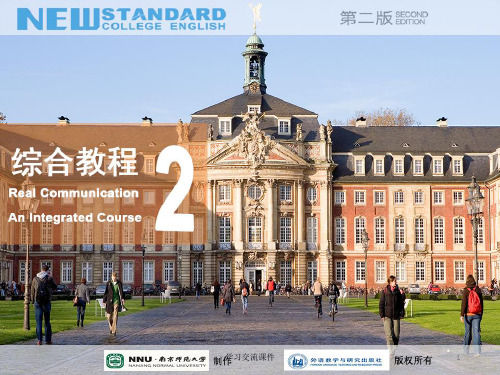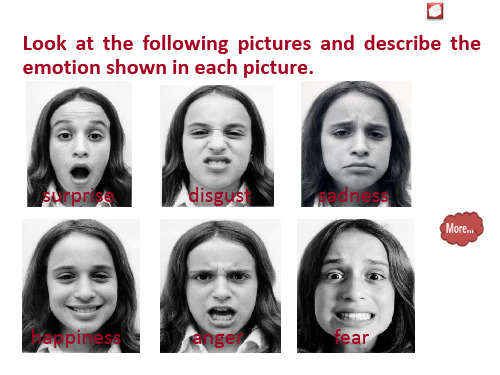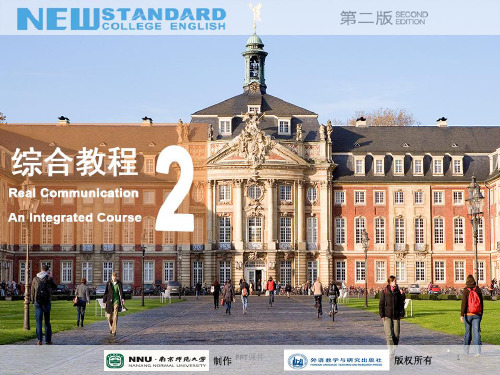empathy and sympathy
新标准大学英语(第二版)综合教程2 Unit 2 B篇练习答案及课文翻译(ppt课件)

学习交流课件
9
Text
Background information
➢ Emotional Intelligence is a book written by Daniel Goleman and published in 1995. The theory of emotional quotient (EQ) was based on earlier work done by other psychologists in the 1970s and 1980s – a quotient is the number that is the result of dividing one number by another, so EQ is a score for behaviour involving emotions. The EQ concept claims that emotional intelligence is as important as the traditionally recognized intellectual intelligence. A high IQ (Intelligence Quotient) does not represent all the elements for a successful career or life.
Everyone knows that high IQ is no guarantee of success, happiness, or virtue, but until Emotional Intelligence, we could only guess why. Daniel Goleman’s brilliant report from the frontiers of psychology and neuroscience offers startling new insight into our “two minds” — the rational and the emotional —and how they together shape our destiny.
新标准英语第二册读写:第二单元第一部分

ship. 他在附近一艘船上目睹了这一事件的发生。
2) vi. & vt. open out 展开;打开;摊开 e.g. He unfolded the map. 他摊开地图。 3) vi. & vt. reveal, make known; become known or
teddy
n. also teddy bear, a soft furry
toy bear (软毛)玩具熊,泰迪熊
Language Points
... Michael retrieved Paul’s security blanket for him.
➢ A security blanket is a blanket which a baby or small child uses for comfort; some children feel more secure when they hold such a special blanket, because the blanket is familiar and has a comforting feel or smell. Some parents tend to give the baby a toy or a thing that is associated with comfort when the baby is in distress. For example, in the West some parents use a dummy (a plastic or rubber object for baby to suck) to comfort babies even though some doctors advise against using a dummy because it may have a long-term negative effect.
人皆有恻隐之心作文800字高中

人皆有恻隐之心作文800字高中Compassion is a fundamental aspect of human nature. 恻隐之心是人类本性的基本特征。
It is the innate ability to feel empathy and sympathy towards others, leading to a desire to alleviate their suffering. 这是一种天生的能力,能够感受他人的痛苦并产生同情心,从而渴望减轻他们的痛苦。
From a young age, we are taught to be compassionate and to care for those in need. 从小,我们就被教导要有同情心,关心那些需要帮助的人。
Whether it is offering a kind word or lending a helping hand, these acts of compassion are what make us truly human. 无论是说一句温暖的话语还是伸出援助之手,这些行为都是使我们成为真正的人类。
Throughout history, countless examples of compassion can be found in various cultures and societies. 在历史上,各种不同文化和社会中都存在着无数关于同情心的例证。
From the teachings of religious figures who preach love and compassion towards all beings, to the heroic acts of individuals who risk their lives to save others, compassion is a universal trait that transcends boundaries. 从宗教人物教导对所有生灵怀有爱和同情心,到那些不惜生命拯救他人的英雄行为,同情心是一种超越界限的普世品质。
指示词语的语用视点、语用移情与离情

广东外语外贸大学
例子: 例子:
a.“来到河北大学,发现我们 咱们 我们/咱们 我们 咱们这里的条件很不错。” b.“来到河北大学,发现你们 你们这里的条件很不错。” 你们 a. 老师说,“希望我们每个同学 我们每个同学都勇于攀登科学的高峰。” 我们每个同学 b. 老师说,“希望你们每个同学 你们每个同学都勇于攀登科学的高峰。” 你们每个同学 a. “中美足球对抗赛又输了,你说这支队伍 这支队伍还有希望吗?” 这支队伍 b. “中美足球对抗赛又输了,你说我们这支队伍 我们这支队伍还有希望 我们这支队伍 吗?”
趋同(convergence)指言语交际中说话人改变自己的言语 习惯或语体风格,包括词语选择等,目的在于取得听话人的 接受或好感,缩短双方之间的社会心理距离,实现双方之间 的相互理解或相互吸引。 趋异(divergence)则是交际一方改变自己的言语习惯或语 体风格,或违反常规地选择词语和语体风格等,以体现说话 人特有的社会身份和群体特征等,以区别于听话人一方,扩 大交际双方的社会心理距离。
该理论已被运用到社会语言学、交际学、会话分析以及语用 学之中,为语用学研究提供了有关语言使用的社会心理学和 普通社会心理学基础,促使人们进一步关注交际策略的选择、 语体风格变化的趋同(convergence)和趋异(divergence) 等所隐含的心理动机和情感因素。 适应论的核心在于从社会心理的角度探讨交际主体(如说话 人和听话人)之间言语或话语的‘相似吸引’(similarityattraction)。如果说话人的话语和听话人的话语之间越相似 或趋于相似,对听话人来讲,说话人的话语就越具有吸引力, 越容易理解,越能体现语言的适应性。
3.人际交往中的语用视点 3.人际交往中的语用视点
自考00600《高级英语》词汇辨别

高级英语词汇区别总结1. mix blendMix: 意为多种成分的混合,各构成成分失去自身的存在Blend: 指可和谐共存的事物的混合Oil and water do not mix.These two colors blend well.2. rambling rumblingRambling: 指(建筑物、街道)布局零乱的。
Rumbling: 指发生隆隆声There are some rambling houses.Listen! There is gun-fire rumbling in the distance.3. relevant relativeRelevant: 意为切题的、恰当的、有重大关系的、有意义的逻辑联系 Relative: 着意于一物受他物影响而产生的依赖的关系。
The witness’s testimony is not relevant to the case.Market values are always relative to the demand.4. exhilarate exasperateExhilarate: 意为使高兴Exasperate: 激怒,使烦恼。
I was exhilarated by her visit.I was exasperated by all the noise.5. jumble clutterJumble: 指不相同的东西混合在一起,混杂;Clutter: 指许多物品堆挤在一起,散乱,杂乱。
His thoughts were all jumbled.His desk is always cluttered.6. terrified terrifyingTerrified: 意味着一种被恐惧镇住的紧张心情;Terrifying: 指(声音、现象)本身具有令人恐怖的因素。
The terrified mother watched the dog attack her child.What a terrifying voice.7. contemptuous contemptibleContemptuous: 指认为某物或某人卑鄙、无耻或毫无价值,并实际上也把这种看法表现出来,轻蔑,侮辱Contemptible: 指任何能引起鄙视或嘲笑的事物,往往指首先或行为准则。
沟通技能_共情倾听

12
“我们公司老板这阵子对我非常挑剔,在这种 处境下我工作很艰难。” “哦,究竟发生了什么事让你这样生气?”
“他说过这周给我加薪的,可是没有加。” “他说话不算数,这让你生气。”
“是啊。他不给我加薪也就算了,可是却给张 丽加薪。”
– 主动抵御指导或帮助对方的冲动:平静下来,放松自己,保 持谦虚,积极倾听。
– 倾听很多,指导很少:鼓励对方的自我表达
放弃自我意识:设身处地从对方的立场和观点来理解 对方的感受,并把你的理解反馈给对方。
识别情感:给对方倾诉的机会,识别对方谈话的真正 情感和含义。
“哦,究竟发生了什么事让你这样生气?”
“哦,给张丽加薪也让你生气。”
13
“张丽比我后来公司,她得到加薪而我没有, 其他人怎么看?难道我没张丽干得好!”
“张丽得到加薪而你没有,你觉得这不公平, 而且让你在同事面前丢脸,是不是?”
“嗯。这让我以后怎么工作啊。”
“这就是你觉得在公司处境很艰难的原因吗?”
“嗯。”
“还有其他的吗?” “没有了,就这个原因。”
2
倾听是件容易的事吗?
Hear 和 Listen 倾听容易做到吗?
– 在所有沟通错误中,不会倾听排在第一位 – 倾听在沟通中的重要性 – 对方所说的75%内容被忽视、误解或遗忘。
3
为什么我们在倾听上会存在问题?
缺乏共情
– 只看“病”,不看“人”
认知失调:具有两种或更多对立的态度时,就会感到 不协调(矛盾),每个人有减少这种不协调的趋势。
“你没必要有那样的感觉,每个人 否定情感 都知道与他相处是多么困难。”
新标准大学英语(第二版)综合教程2 Unit 2 B篇练习答案及课文翻译 ppt课件

Go to the text
PPT课件
8
Text
Daniel Goleman (born March 7, 1946) is an author, psychologist, and science journalist. For 12 years, he wrote for The New York Times, specializing in psychology and brain sciences. He is the author of more than 10 books on psychology, education, science, and leadership.
emotions. Perhaps the popularity of
the book and the concept shows that
many people now recognize the
importance of emotions in our
personal and professional lives.
PPT课件
5
Warming Up
Now skim the text, and find the definition of empathy and sympathy in the passage. (Para. 3) Empathy originates from a sort of physical imitation of the distress of another, which then evokes the same feelings in oneself.
comforted by her mother, as though it were she who had been
公众对范小勤的观感与评价:一篇深度分析文章

公众对范小勤的观感与评价:一篇深度分析文章示例1:Title: Public Perception and Evaluation of Fan Xiaqin: A Deep AnalysisIn the realm of public discourse, individuals like Fan Xiaqin often attract attention due to their unique circumstances or rise to fame. This article aims to delve into the various perspectives and evaluations that the public holds towards Fan Xiaqin, examining both her personal journey and the societal implications of her story.Firstly, let's define who Fan Xiaqin is. She gained prominence as a young boy with striking facial features that resembled those of Chinese actor Jackie Chan. Born in a rural village, his unusual appearance caught the attention of the internet, leading to his online celebrity status. In this context, the public's initial response was a mixture of curiosity, fascination, and同情. Many saw him as a symbol of innocence and an underdog, while others were intrigued by the potential for his future career prospects.The positive sentiment was largely driven by the heartwarmingnarrative of a child from humble beginnings being given a platform to showcase his talents. Some praised his resilience and the hope it instilled in others facing adversity. The hashtag PoorButNoPity became a rallying cry, highlighting the power of human spirit and the potential for upward mobility through hard work.However, not all opinions were favorable. Critics raised concerns about exploitation, fearing that Fan Xiaqin's newfound fame could be detrimental to his well-being. They questioned the ethics of profiting off a child's appearance and wondered if his parents were adequately managing his finances and education. These concerns led to debates about the responsibilities of social media platforms and the role of the public in safeguarding the rights of minors.Moreover, the case of Fan Xiaqin also sparked discussions about the commodification of childhood and the pressure it can exert on young individuals. It raised questions about authenticity and whether his "performance" for the camera was genuine or forced. This debate serves as a reminder that the line between entertainment and exploitation can be blurry, especially in the digital age.In terms of long-term impact, Fan Xiaqin's story has the potential to influence societal attitudes towards beauty standards, representation, and the value placed on talent. His journey might encourage more inclusivity and acceptance, or it could reinforce the importance of protecting vulnerable individuals from undue influence.In conclusion, the public's view of Fan Xiaqin is a nuanced blend of admiration, concern, and introspection. While his story has captivated many, it has also sparked crucial conversations about the responsibilities of fame, the ethics of online exposure, and the need for a more compassionate approach to the lives of those in the spotlight. As we continue to navigate the complexities of modern celebrity culture, it is essential to remember that every individual's journey, regardless of their circumstances, deserves respect and consideration.中文翻译:在公众舆论领域,像范小勤这样的人物因其独特的身份或成名经历而备受关注。
- 1、下载文档前请自行甄别文档内容的完整性,平台不提供额外的编辑、内容补充、找答案等附加服务。
- 2、"仅部分预览"的文档,不可在线预览部分如存在完整性等问题,可反馈申请退款(可完整预览的文档不适用该条件!)。
- 3、如文档侵犯您的权益,请联系客服反馈,我们会尽快为您处理(人工客服工作时间:9:00-18:30)。
原味人文风情:
The Power of Empathy
同理心的力量
So what is empathy? And why is it very different than sympathy?
什么是同理心?为什么它和同情心那么不同?
Empathy fuels connection. Sympathy drives disconnection. Empathy is very interesting.
同理心激发连结。
同情心促使失连。
同理心是非常有趣的。
Teresa Wiseman is a nursing scholar, who studied professions—very diverse professions where empathy is relevant, and came up with four qualities of empathy: Perspective taking (the ability to take the perspective of another person, or recognize their perspectives as their truth), staying out of judgment (not easy when you enjoy this as much as most of us do), recognizing emotion of another people, and then communicating that.
Teresa Wiseman是名护理学者,她研究职业--与同理心相关、非常不同的职业,并提出四种同理心的特性:接受观点(接受他人观点的能力,或是认同他们的观点为他们的事实)、不加评论(这不容易,当你跟我们大多数人一样喜欢评论他人时)、看出他人的情绪、并接着与那交流。
Empathy is feeling with people. And to me, I always think of empathy as
this kind of sacred space when someone's kind of in a deep hole, and they shout out from the bottom and they say, "I'm stuck. It's dark. I'm overwhelmed." And then we look and we say, "Hey," and climb down, "I know what it's like down here, and you're not alone."
同理心是与人一起感受。
对我而言,我总是把同理心想成这种神圣的空间,当某人好像在一个深穴里,而他们从底部大叫,他们说:“我被困住了。
这里好黑。
我受不了了。
”然后我们看看,我们说:“嘿”,然后爬下去说:“我知道在这下面是什么样子,你并不孤单。
”Sympathy is, "Woo! It's bad, ahuh? Now, you want a sandwich?"
同情心是:“哇!真糟糕啊,对吧?现在,你想要个三明治吗?”Empathy is a choice. And it's a vulnerable choice because in order to connect with you, I have to connect with something in myself that knows that feeling. Rarely, if ever, does an empathic response begin with "at least."
同理心是种选择。
那是种很容易受到伤害的选择,因为为了要能与你连结,我必须连结到我自己心里能了解那感受的东西。
一个同理心的回应极少(如果真的有的话)以“至少...”来开头。
I had a...yeah, and we do it all the time, because, you know what, someone just shares something with us that's incredibly painful, and we're trying to silver lining that. I don't think that's a verb, but I'm using it as one.
我有个...对,而我们总是在做这事,因为,你知道吗,某人刚与我们
分享一些极为痛苦的事,而我们试着要“一线希望”它。
我不认为那是个动词,但我要把它当动词用。
We're trying to put this silver lining around it, so "I had a miscarriage."
我们试着要挤出一线希望,所以当人说:“我流产了。
”
"At least, you know you can get pregnant."
“至少你知道你能怀孕。
”
"I think my marriage is falling apart."
“我觉得我的婚姻正在破碎。
”
"At least, you have a marriage."
“至少你有段婚姻。
”
"John is getting kicked out of school."
“John要被学校退学了。
”
"At least, Sarah, he's an A-student."
“至少,Sarah,他是个优等学生。
”
But one of the things we do sometimes in the face of very difficult conversations is we try to make things better.
但我们在面对非常难受的对话时,其中我们有时会做的一件事,是我们试着要让事情好转一点。
If I share something with you that's very difficult, I'd rather you say, "I don't even know what to say right now. I'm just so glad you told me," because the truth is rarely can a response make something better. What makes something better is connection.
如果我跟你分享某件非常难过的事,我宁愿你说:“我现在甚至不知该说什么好。
我只是很开心你肯跟我说。
”因为事实是,回应很少会让事情好转。
能让事情好转的是连结。
